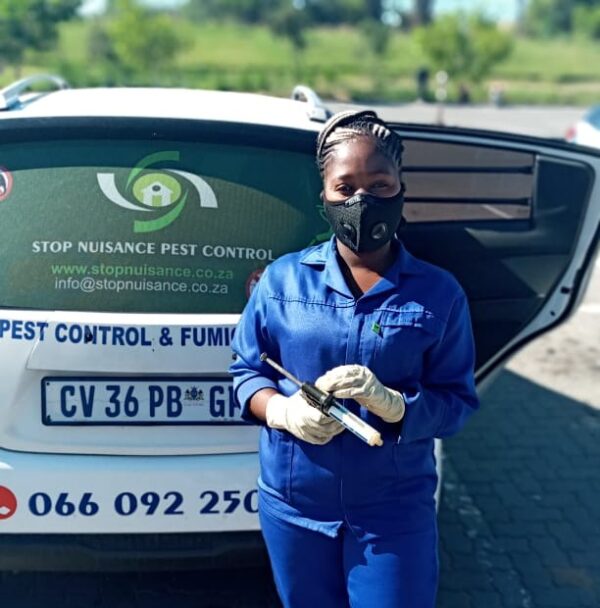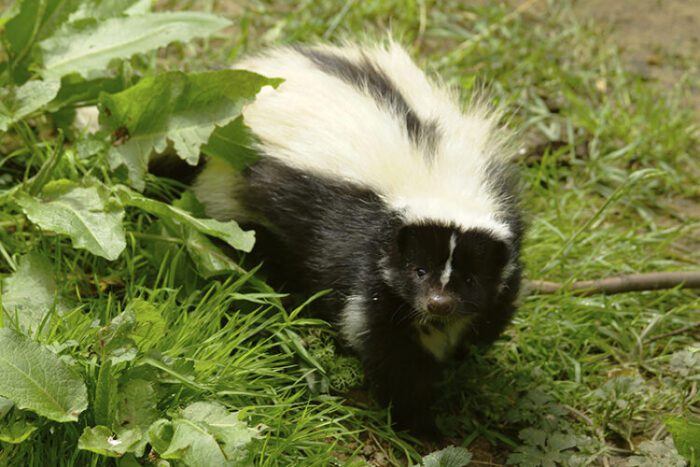Skunks are notorious for the foul-smelling spray they can emit when threatened. However, these nocturnal members of the weasel family play an important role in balancing local ecosystems. One of the ways skunks do this is by feeding on mice, rats and other small rodents. Keep reading to learn more about the skunk’s diet and its taste for vermin.
Table of Contents
What Do Skunks Eat?
Skunks are omnivores, meaning they eat both plant and animal matter. Their diverse diet allows them to adapt to different habitats and seasonal food item availability. Skunks switch between being carnivores, insectivores and herbivores depending on what foods are most readily available.
Some of the main components of the skunk diet typically include:
– Insects such as crickets, grasshoppers, beetles and grubs
– Rodents including mice, rats, voles and shrews
– Reptiles and amphibians like snakes, lizards and frogs
– Bird eggs and newly hatched chicks
– Carrion from roadkill and dead animals
– Nuts, berries, roots, leaves, grains and fungi
Do Skunks Hunt Mice and Rats?
Yes, skunks opportunistically hunt and eat mice and rats. They use their keen sense of smell and hearing to locate small rodents even when tunneling underground or hiding in dense vegetation. Once detected, skunks scratch and dig relentlessly to expose hiding rodents. Their long claws make short work of getting access to hidden tunnel systems.
Skunks catch mice, rats and other rodents with speed and agility. They can rush forwards and snatch a running mouse or rat with a rapid bite. The bite crushes the rodent’s skull or spinal cord for an instant kill.
Why Do Skunks Eat Rodents?
Mice and rats make up a nutritious part of the skunk’s varied diet. Rodents are abundant, especially around human homes and farms where they forage for food scraps. They provide skunks with a reliable high-protein food source to fuel their energetic foraging lifestyle.
Eating mice and rats helps skunks:
– Meet their dietary protein needs
– Maintain body warmth and energy with rodent fat reserves
– Feed hungry growing offspring during breeding season
– Fatten up for winter hibernation
Rodents also provide vital nutrients like amino acids, fatty acids, vitamins and minerals that keep skunks healthy. With rodent populations always on the rise, they make for convenient prey when insects, eggs and berries are scarce.
How do Skunks Catch and Kill Rodents?
Skunks employ various hunting techniques to catch mice, rats and other rodents:
Digging – Uses long claws and snout to rapidly dig into tunnel systems and underground rodent nests.
Scratching – Scratches persistently at hollow logs, brush piles and rock crevices seeking sheltering rodents.
Thrusting – Quickly thrusts head into narrow openings when rodent scent is detected.
Pouncing – Pounces with speed and accuracy to catch fleeing rodents above ground.
Crushing – Inflicts a crushing, killing bite to the rodent’s skull or spinal cord once caught.
Skunks tackle rodents of all sizes with these methods. Mice and juvenile rats are easiest prey. Large adult rats and squirrels pose more of a challenge but get eaten by persistent skunks. They return nightly to a productive feeding spot until all rodents have been cleared out.
What Other Pest Rodents Do Skunks Prey On?
In addition to feasting on mice and two common rat species – the brown rat and black rat, skunks opportunistically prey on other pest rodents. Here are some other nuisance vermin skunks help control:
– Voles: Destroy lawns and vegetable gardens.
– Moles: Tunnelsystems undermines landscape.
– Chipmunks: Invade homes and steal pet food.
– Squirrels: Damage homes while entering attics to nest.
– Woodchucks: Burrow extensive dens leading to soil erosion.
– Muskrats: Undermine pond dams and levees with burrowing.
– Deer mice: Spread harmful diseases like hantavirus and Lyme disease.
By feeding on these destructive pests, skunks help keep local rodent populations in check. Their natural vermin control regulates rodents without the use of poisons that can contaminate groundwater or harm other wildlife.
Are Skunks a Threat to Pets or Livestock?
While extremely helpful in controlling mice and rats around homes and farms, skunks themselves pose little threat to human health or livestock wellness. Skunks focus primarily on small prey easily overpowered with a surprise attack.
Pets harassed by a skunk may get sprayed with the foul mist at close range but are rarely bitten or injured. Free-roaming outdoor pets like cats and small dogs could have a run-in with defensive skunks. But even then, skunks give plenty of warnings before spraying by stamping their front feet and arching their tail upwards.
Skunks may opportunistically feed on chicken eggs but leave adult birds unharmed. Protect coops by securing all entrances to prevent easy nighttime access. Larger livestock like cows, goats, horses and sheep have little conflict with foraging skunks other than getting an occasional startling encounter.
Overall, having skunks patrol around structures at night eliminates far more rodents than they will ever bother in livestock or pets. Their natural pest control services come free of charge!
How Can I Attract Skunks to Control Rats and Mice?
Encourage hungry skunks to frequent your property by making sure their needs for food, water and shelter are met:
Food: Don’t eliminate insect pests completely. Rotting logs, leaf litter and uncleared brush piles provide shelter for insects like grubs and beetles. Compost piles with vegetable scraps are also worm heaven.
Water: Provide a consistent water source like a small backyard pond, birdbath or shallow dishes refreshed daily.
Shelter: Leave wood, rock piles, open sheds and elevated porches for daytime napping spot.
Reduce threats: Keep pets indoors or supervised when skunks are active at dawn/dusk. Use deterrents to keep them out from under buildings.
With a little planning, you can have non-threatening skunks rid unwanted rodents from your property free of charge. Their natural vermin control balances the ecosystem while saving you money on expensive pest control services.

With over 5+ years of experience in pest control and a PhD in Entomology, our author brings a blend of scientific knowledge and practical expertise to Pestifier.com. Passionate about creating pest-free environments, they provide effective tips and strategies for managing and preventing pest infestations. Connect on Facebook for the latest updates and insights.

